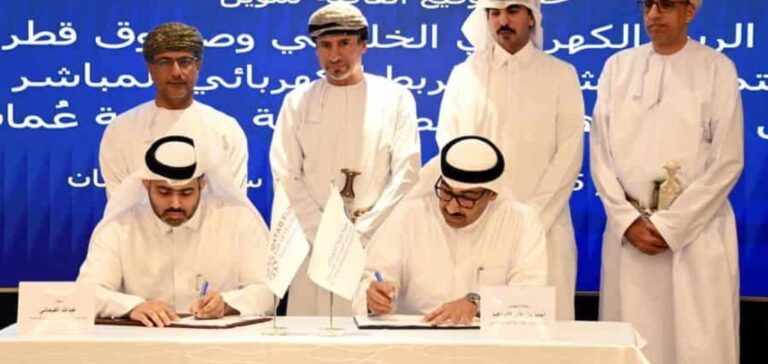The power interconnection project between the Gulf Cooperation Council (GCC) and Oman takes a major step forward with the signing of a $100 million financing agreement between the Gulf Cooperation Council Interconnection Authority (GCCIA) and the Qatar Fund for Development (QDF). The ceremony took place in Muscat under the patronage of Oman’s Minister of Energy and Minerals, Eng. Salim Nassir Al Aufi. The agreement was signed by Eng. Ahmed Ali Al-Ebrahim, CEO of GCCIA, and Fahad Hamad Al Sulaiti, Director General of QDF.
A $700 Million Project for Gulf Energy Integration
This project aims to establish a direct connection between the GCC interconnected network and Oman, with an overall budget exceeding $700 million. It involves the construction of two 400 kV overhead transmission lines linking the Al Sila station in the United Arab Emirates to the newly built Ibri station in Oman. The total length of these lines will span 530 kilometers.
The planned electrical infrastructure also includes the development of two 400 kV substations, one in Ibri and another in Al Baynunah. These facilities will be equipped with advanced control, protection, and communication systems to ensure reliable and optimized grid operations. Additionally, a dynamic compensator will be installed to enhance network stability and increase transmission capacity.
Increased Transmission Capacity and Reduced Operational Costs
The interconnection is expected to provide a total transmission capacity of 1,700 MW, with a net transfer capacity estimated at 1,200 MW. This initiative aligns with the Gulf nations’ goal of improving energy integration and maximizing regional energy synergies.
The economic impact of this project is significant. By optimizing electricity exchanges between Oman and the GCC countries, it reduces the need for costly new power plant investments. Furthermore, by enhancing the flexibility and resilience of the interconnected grid, this infrastructure enables more efficient demand and supply management.
Toward Greater Energy Efficiency in the Gulf
This project is also expected to lower operational costs for participating countries. The improved efficiency of the interconnected grid will reduce annual energy expenditures while facilitating the exchange of surplus electricity among member states.
Finally, by reducing reliance on local generation infrastructure, the interconnection could play a crucial role in optimizing the region’s energy resources. This investment marks a major advancement in energy cooperation within the GCC and contributes to strengthening the Gulf electricity market.






















